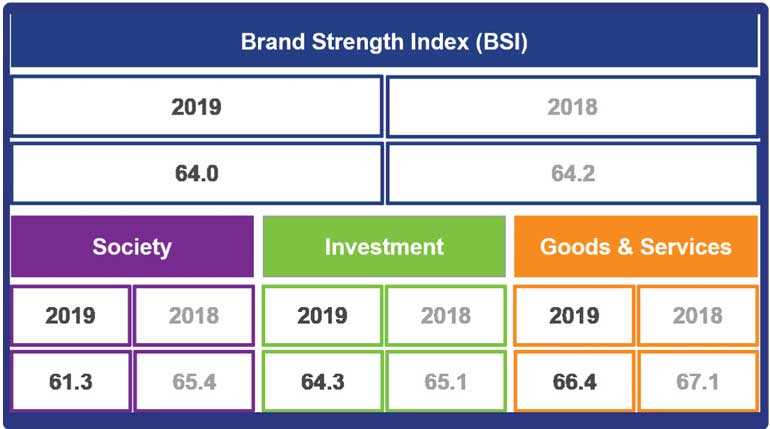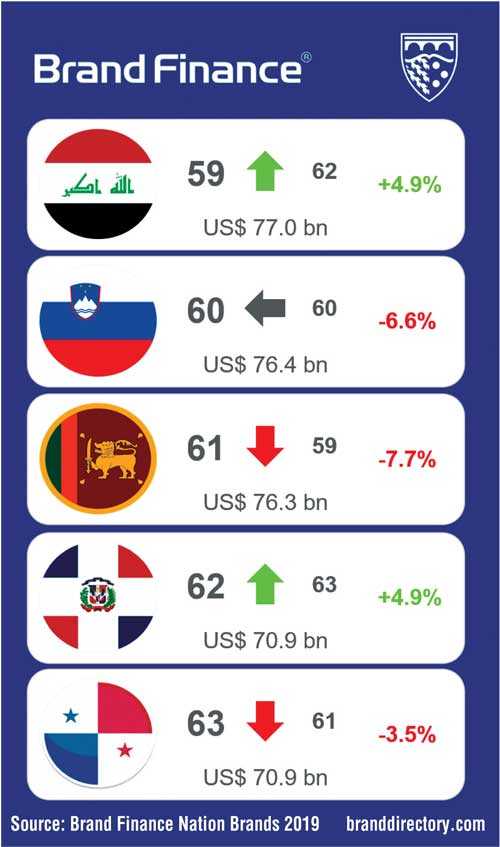Monday Feb 16, 2026
Monday Feb 16, 2026
Monday, 21 October 2019 00:00 - - {{hitsCtrl.values.hits}}

The 2019 Nation Brand Report released by Brand Finance in London last week shows that Sri Lanka’s nation brand rank has dropped two places compared to 2018 from 59 to 61, with an 8% decrease in brand value to $ 76.3 billion.
Brand value, which heavily relies on a country’s economic and governance data, decreased despite the increase in GDP, due to a decrease in the royalty rate and the long-term growth rate of the country. As Sri Lanka fell back, Iraq and Slovenia, which were just below in terms of brand value in 2018, leaped ahead this year in the rankings.
The global report, which is available on the Brand Finance website (https://brandfinance.com/knowledge-centre/reports/brand-finance-nation-brands-2019/), provides a comprehensive analysis of the world’s leading nation brands, and the impact that a country’s reputation and image have on stakeholders and investors. The analysis combines a wide range of measurable economic, demographic, and political factors, and is based on in-depth research which has been carried out by Brand Finance for the last decade.
The BrandFinance® Nation Brands measures the value and strength of the nation brands of 100 leading countries, using an ISO-approved method based on the royalty relief mechanism to value brands. 
Each nation brand has also been accorded a brand strength index rating, which is a benchmarking study of the strength, risk, and future value-creating potential of the brand, much like a credit rating. Sri Lanka’s brand strength index rating is an A+ with a score of 64.0 out of 100, which is just fractionally down from last year’s score of 64.2.
The nation brand strength is determined by reference to performance across three equally-weighted ‘pillars’: Society, Investment, and Goods & Services.
Society pillar
Attributes such as corruption, the judicial system, security, image, quality of life, and corporate ethics contribute towards the Society pillar, which decreased 6.1% YoY to 61.3 points in 2019. Even though the current Government began its term enforcing anti-corruption laws, it appears that the constraint of enforcement has weakened the perception of anti-corruption in the country, which had a negative effect upon Sri Lanka’s Society pillar score. On the other hand, judicial independence continues to be questioned in Sri Lanka, as it remains subject to manipulation through political appointments, further scrutiny and in some cases, even intimidation.
The data for terrorism incorporated into the score is as of 2018 (latest available at the time of the study) and does not allow for the effects of the Easter Sunday attacks that shook the nation in 2019. Before the Easter Sunday attacks, in terms of terrorism incidence, Sri Lanka was considered to be a country with a low terrorism impact, and was one of the only two South Asian countries to experience a decrease in the impact of terrorism over the last 16 years, largely due to the defeat of the Liberation Tigers of Tamil in Eelam (LTTE), as per the Institute for Economics and Peace. This trend has now been broken, and it is likely that this would be reflected in next year’s scores.
Furthermore, the Society pillar was also impacted by the decrease in life expectancy, and the quality of life in Sri Lanka, when compared to last year.
In terms of other corporate ethics factors such as health infrastructure, pension funding, tax evasion, Sri Lanka outperformed neighbouring nations India, Bangladesh, and Pakistan. Sri Lanka’s corporate ethics scores were more in line with countries such as Egypt, Costa Rica and Tajikistan.
Investment pillar
Sri Lanka also saw a 1.2% YoY decrease in its investment pillar score this year, as a result of the drop in the scores for factors such as regulation, use of technology and ease of doing business, which would have been heavily impacted by the coup in Sri Lanka in 2018. The constitutional crisis that became international news did not bode well for foreign investment, and ripples have been felt due to a sense of weakened international investor confidence.
Despite these factors weakening investment, there have been a flurry of start-ups in Sri Lanka, especially those that are technologically driven, which may be due to Sri Lanka improving its skilled workforce, tax benefits for tech start-ups and government-driven initiatives to support companies in infrastructure and research and development. This has reduced the overall impact on the Investment pillar score.
Goods and Services pillar
The Goods and Services pillar, which is made up of governance, the market, and tourism, saw a marginal decrease in its score compared to last year. The drop was mainly due to a decrease in the size score (based on the GDP and imports of goods & services), as Sri Lanka’s economic growth slowed down compared to other nations, and due to the weaker performance of market development.
Nevertheless, the improvements in trade rules, and government policy, which contributes towards the governance pillar, was able to reduce the overall impact on the goods and services pillar.
The future
At an overall level, Sri Lanka’s brand value performance has been negatively impacted due to ineffective implementation. Whilst the Government’s intentions were good there was considerable slippage in the follow through to implementation.
It will be interesting to see how the upcoming Presidential Election unfolds and the impact it may have on Sri Lanka’s nation brand value in the years to come. However, once the Easter bombing incident is accounted for in next year’s nation brand result, it would be difficult to expect a recovery to take place. We are therefore looking at 2021 for an upswing in performance, by which time the impacts and influence of the new President and Government would be taken into account in Sri Lanka’s nation brand value.